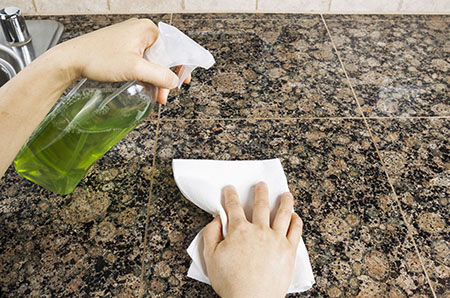Care and Cleaning of Your Quartz Countertops
 Once upon a time, natural stone countertops were incredibly popular in kitchens everywhere. Homeowners loved rustic granite with all of its variations and patterns. Sleek and beautiful marble dazzled the eye with its striations and delicate veins. Such materials were perfect for bringing a little bit of nature right into people’s homes.
Unfortunately, natural stone also brought its share of headaches. Despite being rugged and very durable, materials such as granite and marble were a bit delicate and temperamental. Because natural stone was porous, homeowners discovered that it needed to be carefully and thoroughly sealed before it could be used in their kitchens. This protected it from staining and prevented it from becoming etched.
Still, even with proper sealing, homeowners noticed that their stone wasn’t a set-it-and-forget-it installation. They had to be extra cautious not to allow liquids such as lemon juice or vinegar sit for any period of time on their natural stone surfaces. This posed a challenge in many a well-used kitchen. They also noticed that over time, the sealant on their stone countertops would wear thin and the surface would begin to stain easily unless it was carefully resealed.
Over time, homeowners were put off of natural stone. “We want the sleek beauty of stone countertops, but we don’t want all of this maintenance!” And thus, they discovered quartz. Because quartz was an engineered stone, it was made to be non-porous and highly durable. It was also very beautiful and was available in a huge variety of colours to suit all styles. And the people rejoiced!
Once upon a time, natural stone countertops were incredibly popular in kitchens everywhere. Homeowners loved rustic granite with all of its variations and patterns. Sleek and beautiful marble dazzled the eye with its striations and delicate veins. Such materials were perfect for bringing a little bit of nature right into people’s homes.
Unfortunately, natural stone also brought its share of headaches. Despite being rugged and very durable, materials such as granite and marble were a bit delicate and temperamental. Because natural stone was porous, homeowners discovered that it needed to be carefully and thoroughly sealed before it could be used in their kitchens. This protected it from staining and prevented it from becoming etched.
Still, even with proper sealing, homeowners noticed that their stone wasn’t a set-it-and-forget-it installation. They had to be extra cautious not to allow liquids such as lemon juice or vinegar sit for any period of time on their natural stone surfaces. This posed a challenge in many a well-used kitchen. They also noticed that over time, the sealant on their stone countertops would wear thin and the surface would begin to stain easily unless it was carefully resealed.
Over time, homeowners were put off of natural stone. “We want the sleek beauty of stone countertops, but we don’t want all of this maintenance!” And thus, they discovered quartz. Because quartz was an engineered stone, it was made to be non-porous and highly durable. It was also very beautiful and was available in a huge variety of colours to suit all styles. And the people rejoiced!
You, too, can have beautiful and low-maintenance quartz countertops in your kitchen. Should you make this smart choice, here are a few pointers for taking care of your quartz and keeping it looking perfect for years to come.
- Although quartz is practically scratch- and chip-resistant, it is not heat resistant. Placing a hot pan directly on your quartz countertop will damage it. Use a potholder or invest in a few trivets to protect your counters from hot skillets and roasting pans.
- Quartz doesn’t require any specific cleaners in order to keep it looking shiny and beautiful. For everyday cleaning, simply use a bit of dish soap mixed with warm water to wipe away any dirt and debris.
- Although quartz doesn’t require any specific cleaner, that doesn’t mean you can use any old cleaner. Don’t use anything that’s overly harsh or abrasive on it. Generally, if the label suggests you use gloves or not breathe in the fumes, it’s not a good idea for your quartz. Similarly, super-scratchy cleaners and pads (such as steel wool) may damage your quartz.
- If you have an area of quartz that needs a bit more cleaning than usual, use a gentle cleaner. There are plenty of kitchen sprays and multi-purpose cleaners that will do the job.
That’s it! There’s no need to seal and re-seal quartz as you would need to do with natural stone. Simply keep it wiped clean, protect it from heat and enjoy it for a very long time.
- What to Consider when Buying Quartz Countertops
- Maintenance Tips for Quartz Countertops
- Is Quartz a Safe Material for Countertops?
- How To Get The Best Price On Quartz Countertops
- Estimating the Cost of Quartz Countertops
- Choosing Quartz Countertop Color
- Blue Quartz Countertops: What You Need To Know
- All You Need To Know About Quartz Tile Countertop
- Advantages of Installing Countertops Made Of Quartz
- How to Choose a Quartz Countertop
- Why Quartz Kitchen Countertops Are the New Trend
- Care and Cleaning of Your Quartz Countertops
- Are Quartz Countertops Right for Your Kitchen?
- 3 Reasons Why Quartz Kitchen Countertops Are Simply Better
- Why the Best Kitchen Countertops Are Made of Quartz
- Kitchen Countertops: Why Quartz Beats Granite Every Time
- Granite vs Quartz Countertops: Which Material is Best?
- Easy and Beautiful: Care and Maintenance of Your New Quartz Countertops

